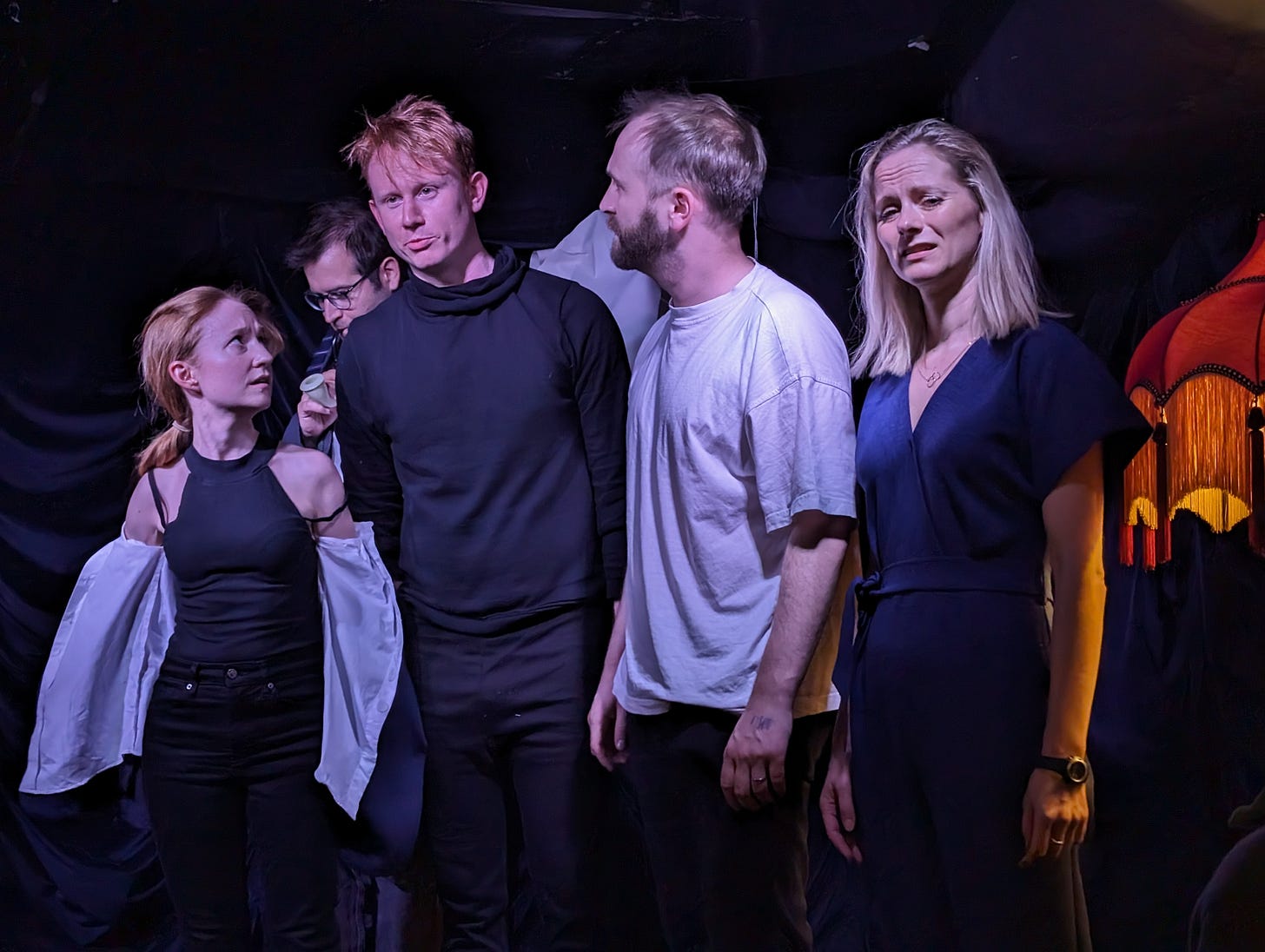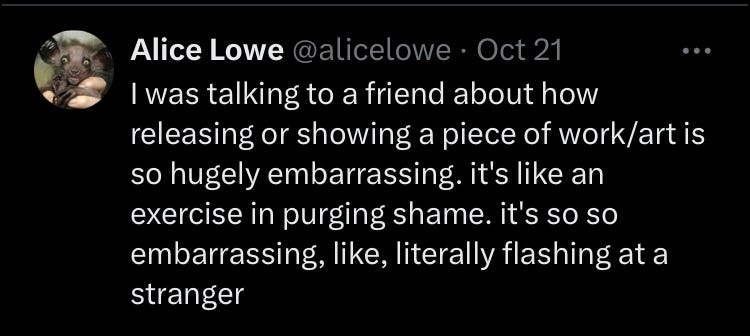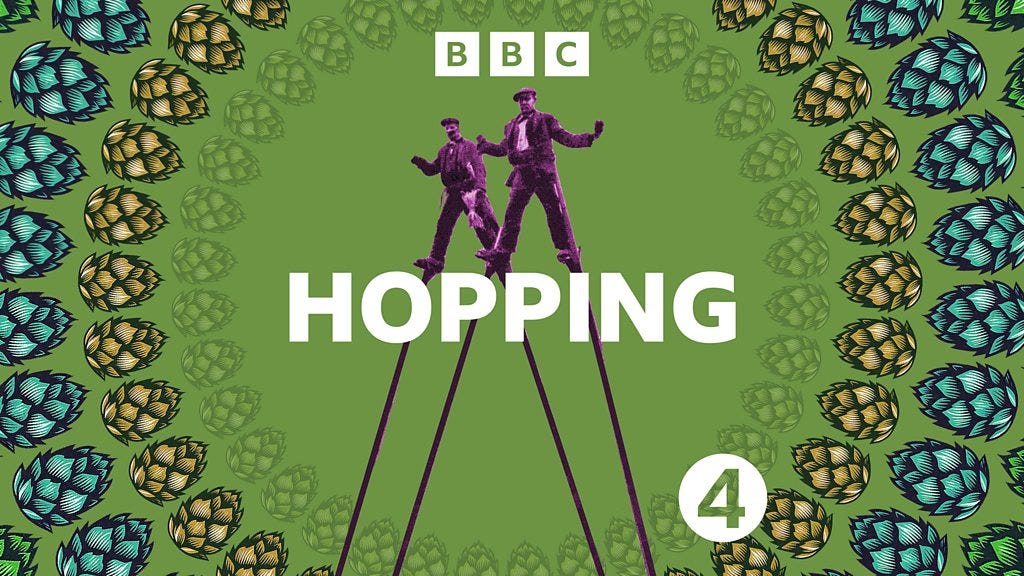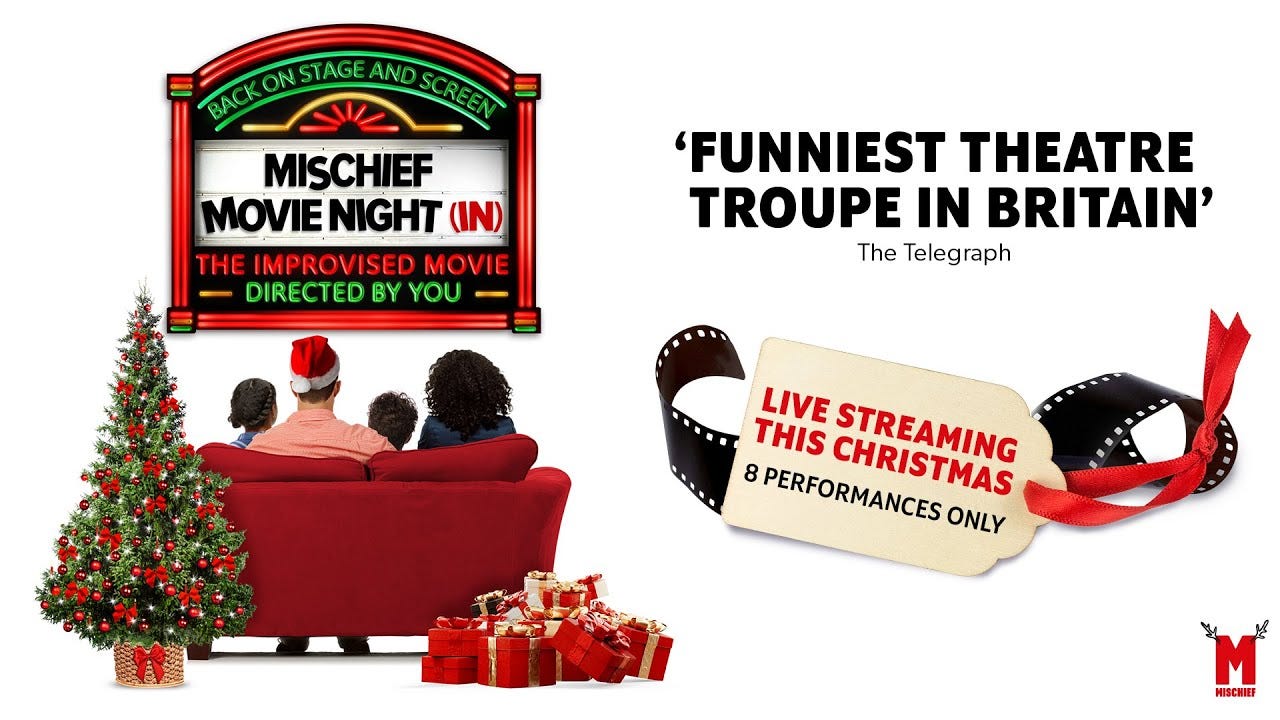Getting creatively stuck
And how to get unstuck again
This Autumn I was plagued by, er, well plague, and by being so knackered from commuting that it was hard to think straight or get going with creative projects. I caught one of those pesky non-covid viruses that wasn’t quite bad enough to skip work for. As soon as I’d recovered I flew to Norway to do Austentatious (the improvised Jane Austen show) but was probably not firing on all cylinders, and when I got back it took me a long time to return to normal.
Those of you who have been reading this newsletter for a while will know that I have been in the process of making a solo show, but, having taken a break from it, I have struggled to return. This is unusual for me. Normally I find it easy to get something down on paper, but this time it’s been tricky.
I had an Outside Eye session with renowned comedy consultant/director/legend, Dec Munro, who watched some of my material and gave me notes on what he’d seen. He was great, had lots of perceptive insights and notes, and the whole thing was very bracing.
The process of showing Dec my material consisted of me performing the show (as it is so far) in a minuscule room with glass walls. A lot of what I do is about interacting with the audience so performing my work to one person was pretty embarrassing. At one point I was literally standing in a glass cube, classical music playing for an awkward amount of time, while dressed as a giant vegetable. It really was “cringe”, as a young person would say and is now probably out of date, rendering it even more cringe. Or crange. Or whatever the new word is.
I think Alice Lowe expressed this feeling of embarrassment best on the platform that many of us are trying/failing to leave:
Stand up and conventional comedy usually seeks guaranteed outcomes from audience responses, but this is not necessarily the case for alternative comedy. I don’t want guaranteed outcomes, I want to adapt to whatever an audience member says. This meant that when I was sharing my material I was having to improvise responses as to what audience members might say, as well as improvising my character’s responses. This is where improv directors come into their own. They can do audience participation for days, in effect playing numerous audience members. That being said, it can be useful for alternative acts to have an Outside Eye who isn’t from an improv/clown background, as it means that their focus will be on other (weaker) things that need improving. I certainly found this to be the case, which meant that the whole experience was tough, but good for me. Like going to the Gym and only marginally less sweaty. Dec left me with some solid advice too: he advised me not to lean on the interaction/loose moments while developing the show. Painful though this will inevitably be, it has motivated me to improve the writing.

Initially the process of unravelling all my choices in the session made me question everything I had made to the point where subsequently I was a bit scared of writing anything in case it was bad. (Being inside my brain is so FUN you guys!!) In addition I’m trying to channel my own feelings into the show more than I usually would, and this has made me nervous about committing my ideas to paper. The whole thing requires a lot of thinking and there isn’t much space to think in life is there? Unless you never have to work I guess, but who are these people who just don’t have to work? And how are they living in London???
Anyway, after many fruitless attempts at re-writing bits of my show and coming up against a brick wall, I finally had a Saturday night off so I forced myself to get literally anything down on paper. I told myself that it could be terrible as long as I made a start, and once I started I eventually got into the flow. It was a very rock and roll Saturday night, tapping away on my laptop, accompanied by the sounds of Halloween partying and Diwali fireworks outside.
There are a few things that help me when I’m feeling creatively stuck. Most of these approaches I’ve been using for years, but the first one I came across recently and is expressed in a way which, on hearing it, made total sense to me. If you’re struggling with a project then I hope these thoughts might help you as well.
Work general to specific
Mike Birbiglia’s Working it Out podcast, is a frequent source of creative comfort and inspiration for me. In each episode Birbiglia chats to a comedian/writer about comedy, life, process. In this episode, comedian Matteo Lane talks about the lessons he learnt at Art School, where he was instructed to ‘Work general to specific’, to ‘Work towards the masterpiece not at the masterpiece.’ As a comedian Lane has used this approach - getting the general shape down first and working his way in - ever since. I love this! You can listen to this discussion at 32 minutes in, but to be honest it’s well worth a listen to the whole episode. Not least to hear Lane’s incredible impression of Judy Garland.
Forgive yourself the horror of the first draft
I’ve also heard this referred to as writing “the vomit draft” which is gross but accurate. Forgiving yourself a messy first draft, is very much in line with the improv mindset. Improvisers are encouraged to go with their first thought, the thought that is obvious to them. To put this in writing terms, the aim of creating the first draft is to get your initial ideas out, and delay judgement, so that your editing brain can tidy it up later.
Not this…
My writing partner Lucy Trodd and I use this phrase all the time, meaning “This is the kind of joke/idea I mean but it’s not exactly this and we’ll eventually find a better version.” But “Not this” is catchier.
Do the thing
Again this chimes with improv, specifically narrative improv. When two beginner improvisers are doing a scene, for example set on Mount Everest, they will often argue about whether they should or shouldn’t go up there, one of them invariably has forgotten the map, another one has shoes that leak, etc. It’s at that point that “do the thing” becomes valuable. Just do it. Set off, cut to the summit, or even better, be up the mountain already. Similarly, rather than waiting until the circumstances are exactly right for writing, just do the thing. Get on with it. The Pomodoro Technique helps with this if you’re totally struck. Set a timer for 25 minutes. When it goes off you probably won’t want to stop writing…
Create deadlines
Put a date in the diary for when you next have to share your work. Preferably while dressed as a giant vegetable for maximum humiliation.
NEWS
Hopping.
Hopping, written by Lucy Trodd and I, was broadcast on BBC Radio 4 last month, and is now available to listen to on BBC Sounds. It’s set in the 1930’s amid the world of hop-picking. The cast are fantastic, we really enjoyed writing it and the process from start to end was a huge learning curve in multiple ways.
Listen to Hopping here
Mischief Movie Night (In)
Sadler’s Wells London, and live-streamed.
I’m in the Christmas run of this anarchic, silly show from the Mischief Theatre team. These are my dates which you can watch IRL or stream:
December 21st (7pm and 9pm), 22nd (3pm and 6pm) and 23rd (7pm and 9pm).
Buy Mischief tickets here
Stay tuned in the new year for WIP dates and to hear about a couple of other exciting new projects coming soon…




